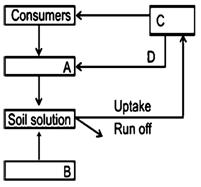Given below is a simplified model of phosphorus cycling in a terrestrial ecosystem with four blanks (A-D). Identify the blanks.

Options :
A
B
C
D
1.
Rock minerals
Detritus
Litter fall
Producers
2.
Litter
Producers
Rock minerals
Detritus
3.
Detritus
Rock minerals
Producer
Litter fall
4.
Producers
Litter fall
Rock minerals
Detritus

A
B
C
D
1.
Rock minerals
Detritus
Litter fall
Producers
2.
Litter
Producers
Rock minerals
Detritus
3.
Detritus
Rock minerals
Producer
Litter fall
4.
Producers
Litter fall
Rock minerals
Detritus

To unlock all the explanations of 38 chapters you need to be enrolled in MasterClass Course.

To unlock all the explanations of 38 chapters you need to be enrolled in MasterClass Course.
Match the following and select the correct option :
(a) Earthworm (i) Pioneer species
(b) Succession (ii) Detrivore
(c) Ecosystem service (iii) Natality
(d) Population growth (iv) Pollination
a b c d
1. (i) (ii) (iii) (iv)
2. (iv) (i) (iii) (ii)
3. (iii) (ii) (iv) (i)
4. (ii) (i) (iv) (iii)

To unlock all the explanations of 38 chapters you need to be enrolled in MasterClass Course.

To unlock all the explanations of 38 chapters you need to be enrolled in MasterClass Course.
Vertical distribution of different species occupying different levels in a biotic community is known as:
1. Stratification
2. Zonation
3. Pyramid
4. Divergence

To unlock all the explanations of 38 chapters you need to be enrolled in MasterClass Course.

To unlock all the explanations of 38 chapters you need to be enrolled in MasterClass Course.
The mass of living material at a trophic level at a particular time is called:
1. Standing state
2. Net primary productivity
3. Standing crop
4. Gross primary productivity

To unlock all the explanations of 38 chapters you need to be enrolled in MasterClass Course.

To unlock all the explanations of 38 chapters you need to be enrolled in MasterClass Course.
In an ecosystem the rate of production of organic matter during photosynthesis is termed as :
1. Gross primary productivity
2. Secondary productivity
3. Net productivity
4. Net primary productivity

To unlock all the explanations of 38 chapters you need to be enrolled in MasterClass Course.

To unlock all the explanations of 38 chapters you need to be enrolled in MasterClass Course.
Secondary Succession takes place on/in :
1. Degraded forest
2. Newly created pond
3. Newly cooled lava
4. Bare rock

To unlock all the explanations of 38 chapters you need to be enrolled in MasterClass Course.

To unlock all the explanations of 38 chapters you need to be enrolled in MasterClass Course.
Most animals are tree dwellers in a :
1. thorn woodland
2. temperate deciduous forest
3. tropical rain forest
4.coniferous forest
The term ecosystem was coined by :
1. E. Warming
2. E.P.Odum
3. A.G. Tansley
4. E. Haeckel
The primary producers of the deep-sea hydrothermal vent ecosystem are
1. coral reefs
2. green algae
3. chemosynthetic bacteria
4.blue-green-algae
Which ecosystem has the maximum biomass
1. Forest ecosystem
2. Grassland ecosystem
3. Pond ecosystem
4. Lake ecosystem


